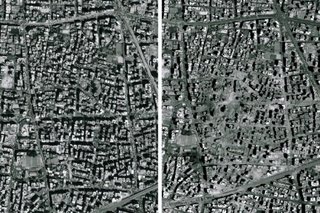 [People ask me sometimes (or is it just that nagging voice in the back of my head?) why I post so much about the terrible events in the Third Galaxy, transmitted to me by an unemployed angel there who lets itself be known by the odd name of “Man-u El Ishman”.
[People ask me sometimes (or is it just that nagging voice in the back of my head?) why I post so much about the terrible events in the Third Galaxy, transmitted to me by an unemployed angel there who lets itself be known by the odd name of “Man-u El Ishman”.The answer is quite simple: it’s just so depressing at times just to keep oneself even vaguely oriented as to what is going on in our world or think about the shit that looks like it’s coming down the tube. By referring to the Third Galaxy, I remind myself that not only could things get worse before they get better – they could get worse and not get better!
On the other hand, if you ignore the insane logic behind the War Zones and look at it in its own context, you find that its internal consistency tempts you to let you mind fly away to La-La Land and go with the flow…]
"...Few people really understand the wonder of the War Zone Act and how it not only made possible but is instrumental in maintaining the World Peace.
Of all the things Ronald Rexona has done to promote and protect the security of the United State of Arrogance, this alone would have secured him lasting honor and the love of all our loyal citizens.
When earlier leaders talked about peace, they only meant that there were no wars at the moment. Because of their total lack of planning, wars occurred without proper preparation. This was very bad for economy and has, in the past, been the direct cause of much economic suffering companies producing weapons have had to endure.
It is an accepted truism that war is good for the economy. However, that is not true when wars are allowed to happen haphazardly. Too many wars followed by few or perhaps no conflicts at all result in boom-bust, inflation, depression, lack of labor followed by unemployment, strikes and even worse forms of social unrest.
With carefully controlled War Zones, our military is kept occupied at a steady level they can cope with which keeps their skills well honed. Because they are kept fit and trim to fight, the result is a well-documented reduction in battlefield casualties as well as loss of material.
The benefit of reduced casualties is obvious, but less intuitive is how reduced loss of material could benefit our weapons manufacturers. But the fact has been proven conclusively through extensive cost-benefit analysis which too complicated to describe here. However, the short explanation is that when a piece of weaponry, such as a tank or airplane, is destroyed before its useful lifetime has expired, factories have to gear up and produce a new tank or airplane before it was scheduled. This in turn creates bottlenecks in the flow of production, putting us back in the situation mentioned earlier regarding the negative value of wars just happening “off the cuff”, so to speak.
Ronald Rexona was once asked how he came upon the idea for War Zones and he replied, “Well, you remember when that city, Blue Ptomaine, got flooded by that monster storm? Well, when we saw how it gave a good chance to do some badly needed urban renewal. But I got to thinking, why wait for an Act of the Great Potato – if we plan things ourselves we can get rid of slums and undesirable elements with having so many real nice property destroyed like what happened in Blue Ptomaine.
The bottom line is that our factories are able to produce more efficiently, are able to plan ahead and have new models ready in time for deployment on schedule. Before the innovation of War Zones, it was only toy manufacturers getting tooled up for Christmas who were able to enjoy this kind ability to schedule production many months ahead."
[Before and after picture of War Zone LB 86-69 (a.k.a. "Guanocow", pls. note the effieciency of the "slum clearance" aspect of the operation!]





1 comment:
Gee, anonymous, I'd really be interested if I could get paid for picking my nose.
Don't laugh! I can pick my nose and flick my boogers like a pro! In fact I could have been a pro, but broke a finger nail at the wrong time in what would have been my career!
(sigh!) but I scratch my ass pretty good also -- how much do you think that would be worth?
Post a Comment